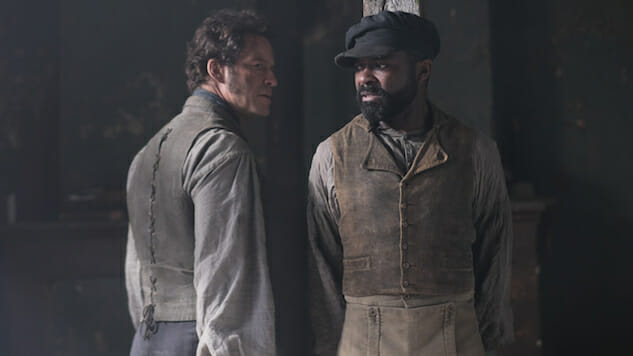Why the New Les Misérables Is the Best Adaptation Yet
Photo: Laurence Cendrowicz/BBC
Watch Keri’s video breakdown of the new Les Misérables below.
Written by Victor Hugo and published in 1862, Les Misérables is known as one of the great novels of the 19th century. And as the title implies, it’s all about misery, of a sort that’s difficult for most of us to imagine.
I don’t know anyone who has had to sacrifice as Fantine does to feed their children.
The most recent retelling of the novel—which many people familiar with the story through the stage musical and its screen adaptations may not have read—is brought to you by Masterpiece, and it lives up to the name. There have been so many prior versions of the tale, and most of them condense it to two or three hours. The beauty of turning Les Misérables into a miniseries is that we get a long view of the characters.
For example, I would have loved to have seen more of Fantine’s story when the character was played by Uma Thurman or sung by Anne Hathaway, but most of these stories quickly move on from the sacrifice of the mother because time is a major constraint.
This newest version allows you to see Fantine (Lily Collins) at her best and her worst— although, to be clear, her worst is cruel and unusual. I had to leave the room because of the graphic nature of one scene.
The 1998 version of Les Misérables, it’s not nearly as graphic: Yes, she sells her hair, her body, and leaves her child, but we are quickly ushered into the relationship of Jean Valjean and Cosette.
In this version, we see Fantine in three episodes—that’s three hours. Not only do we see her wonderful romance and happy times with Cosette, but we see the deterioration of circumstances for a single woman with a child.
In addition to having more of her story, we really see Cosette, from her life as a newborn through her time with the Thénardiers, with Olivia Colman playing her cruel surrogate mother.
You see how things get to be so horrific for Fantine through the abuse of the Thenardiers. It grows. They take advantage of her because they have the one thing she values most and cannot actually have. It’s unique to this production to have this deep dive into their character.
Time may heal all wounds, but the kind of wound that Fantine experiences doesn’t leave you when you have been immersed in it fully. It’s clear that it doesn’t leave Jean Valjean either.
Dominic West, who is not only an actor in the miniseries but also a producer, embodies tragedy and redemption with ease. West can seem grizzled in a way that Hugh Jackman, who played the same character in the recent movie musical, could not. Liam Neeson was definitely as gritty in the 1998 version, but in my opinion lacked the appeal that made me want him to win.
David Oyelowo, who like West is also a producer on the project, plays Javert—and as one would expect, he is amazing in the role. Unlike other films adapted from the book, The miniseries imagines people of color to being a part of the story. Nor is it an empty or revisionist gesture: In fact, it is historically accurate. Thomas Alexander-Dumas’s mother was of African descent. He was a war hero and his son, Alexander Dumas, was of course the famous author of another French masterpiece, The Three Musketeers. So, it’s completely conceivable that Javert could have looked like Oyelowo.
Les Misérables is a sad story, even if you include beautiful music. Even if you add top talent. This version is still depressing, but it lets you see more of the characters’ stories. You get a glimpse of their rare happy moments and you understand the reasons they suffer, the reasons they move forward or stop. This newest iteration of the classic story is well worth your time. It will certainly make you less miserable.
Les Misérables premieres Sunday, April 14 at 9 p.m. on PBS.
Keri is a professional chatterbox who loves watching TV & movies, reading about pop culture, and gawking at any craziness on the internet. You can follow Keri on Twitter.







































